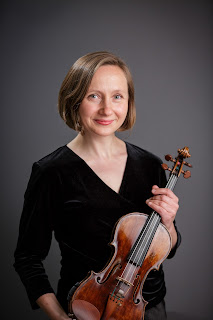The chamber side of
the KSO will be in evidence this week as the Principal String Quartet will present a concert at noon at the Square Room on Wednesday, Sept. 27,
and the Knoxville Symphony Chamber Orchestra will bring a diverse program
to the Bijou on Sunday afternoon at 2:30.
The Square Room is
on Knoxville's Market Square downtown, hence the name. It also
happens to be square in shape, but most rooms are, so in this case,
the venue is named after its location, not its design.
The quartet will
perform music of Mozart, Piazzolla and Mendelssohn. Mozart's quartet
K. 159 is not your average “Baby Mozart” quartet; there is a
quirkiness to it that indicates the composer's impatience with
convention- with being square. The first movement Andante
grazioso has
a gentle start and
is neither slow nor fast; a
piece you might peg
as
a middle movement. Oddly sized phrases and differing textures keep
you guessing as to the musical destination. The middle movement in
this case is an urgently skittish
Allegro. It has to be
one of the best G minor movements ever written, on a list dominated
by Mozart's “emo” gems.
The finale is a Rondo, but you will probably want to call it a Theme
and Variations. More punchy, boppy, B-flat major fun than you can
shake a stick at, from a
14-year-old composer who was holed up in Milan working
on his eighth opera.
Astor
Piazzolla took traditional string quartet playing for
a wild ride in 1989 with his
Four for Tango,
written for
the Kronos Quartet. Its
highly percussive, urban complexion will set the table for Felix
Mendelssohn's String Quartet op. 44, No. 2 in E minor.
Mendelssohn's rich palette keeps the music bright and charming in
spite of the minor tonality.
The
Sunday Chamber Classics series
concert will begin in
Revolutionary times, with Haydn's Symphony No. 60, the “Distraught”
from 1775. Prokofiev's “Classical” Symphony will bridge the
140-year gap between itself and the Haydn by melding classical-era
constructs with 20th-century
tonal cheekiness. The concert will close with Maestro Aram Demirjian
leading HK Gruber's Frankenstein!!
This narrated showpiece from
the Third Viennese School has
every trick in the book coming in to play; “a show with everything
but Yul Brynner,” as we used to say in the '80s. Gruber
is said to be a distant relative of the composer of Silent
Night, Franz Gruber, but that is
where the similarity ends. This is music you will want to fasten
your seatbelt for! Listen safely...








